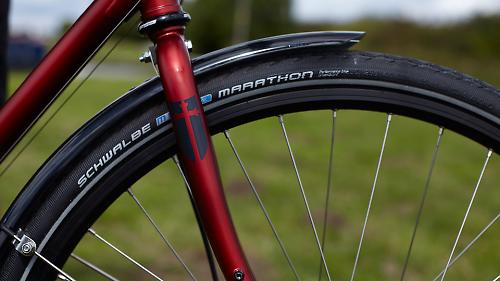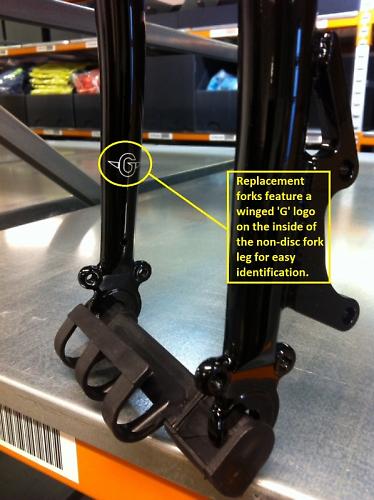- News
- Reviews
- Bikes
- Accessories
- Accessories - misc
- Computer mounts
- Bags
- Bar ends
- Bike bags & cases
- Bottle cages
- Bottles
- Cameras
- Car racks
- Child seats
- Computers
- Glasses
- GPS units
- Helmets
- Lights - front
- Lights - rear
- Lights - sets
- Locks
- Mirrors
- Mudguards
- Racks
- Pumps & CO2 inflators
- Puncture kits
- Reflectives
- Smart watches
- Stands and racks
- Trailers
- Clothing
- Components
- Bar tape & grips
- Bottom brackets
- Brake & gear cables
- Brake & STI levers
- Brake pads & spares
- Brakes
- Cassettes & freewheels
- Chains
- Chainsets & chainrings
- Derailleurs - front
- Derailleurs - rear
- Forks
- Gear levers & shifters
- Groupsets
- Handlebars & extensions
- Headsets
- Hubs
- Inner tubes
- Pedals
- Quick releases & skewers
- Saddles
- Seatposts
- Stems
- Wheels
- Tyres
- Health, fitness and nutrition
- Tools and workshop
- Miscellaneous
- Cross country mountain bikes
- Tubeless valves
- Buyers Guides
- Features
- Forum
- Recommends
- Podcast
TECH NEWS
Genesis recalls steel forks on three 2015 road bike models
Genesis Bikes has issued a recall for the steel fork used on its 2015 Croix de Fer 10 and 20 bikes, and the Tour de Fer frameset. Forks will be replaced free of charge.

Genesis says: “We have identified that the steel forks on the following three models do not meet our stringent standards for long term durability.”
The company says there is “no immediate risk to safety” and there have been no reported failures. Affected forks will be replaced with a new fork, free of charge. If you have one of these bikes, you’re advised to contact your nearest Genesis dealer as soon as possible.

Replacement forks can be easily identified by the winged ‘G’ logo on the inside of the fork blade as shown above, so if your fork has this logo, your fork is fine and your have nothing to worry about. If there’s no logo on the inside of your fork, it needs replacing.
To clarify, the three models affected are the following:
2015 Genesis Croix de Fer 10 bike, Rosso Red.

2015 Genesis Tour de Fer frameset, Matt Silver.

2015 Genesis Croix de Fer 20 bike, White.

More info at www.genesisbikes.co.uk
David worked on the road.cc tech team from 2012-2020. Previously he was editor of Bikemagic.com and before that staff writer at RCUK. He's a seasoned cyclist of all disciplines, from road to mountain biking, touring to cyclo-cross, he only wishes he had time to ride them all. He's mildly competitive, though he'll never admit it, and is a frequent road racer but is too lazy to do really well. He currently resides in the Cotswolds, and you can now find him over on his own YouTube channel David Arthur - Just Ride Bikes.
Latest Comments
- Clem Fandango 40 sec ago
Whereas the non-motornormative might see: excessive congestion = driving is a pain the ar5e, so is there an alternative for some journeys? Why yes...
- hawkinspeter 11 min 26 sec ago
THE EMPIRE NEVER ENDED!
- froze 39 min 6 sec ago
I bought a Topeak Joe Blow Sport III Pump about 9 months ago, quite frankly, I was not impressed with it. The base has too much flex it in it, the...
- froze 52 min 38 sec ago
Ride single file, stay close to the curb? Where I live, I get people screaming at cyclists telling them they don't belong on the road, I was...
- james-o 1 hour 1 min ago
The worst thing about all this is learning that Bon Scott's family tried to make sunglasses with his name on.
- KDee 1 hour 5 min ago
There's a whiff of Martin73 about that post from whosatthewheel.
- chrisonabike 1 hour 52 min ago
Sustainable public transport (buses)? Sustainable flying?...
- mdavidford 2 hours 32 min ago
I assumed that a commuter road was like the Room of Requirement - it travels to wherever people need to drive on it.
- Simon14 4 hours 41 min ago
Anyone 6'3 here? Torn on sizing. I ride size 58 in Specialized and Cannondale, Large in Giant, Large in Canyon, saddle height 82cm. I really like...
- luk 5 hours 28 min ago
WTF is wrong with those jerseys? look where are the pockets ! a few cm above elbows.... how the hell do you want to access them ???






Add new comment
6 comments
I agree it's likely an issue with the welding. The welds on a fork get a pounding so it's best to be cautious.
Designing weld procedures (selecting the welding rods, the weld profile, the amount of heat input during the weld and and degree of any pre-heat) is more complicated than you might think and the procedure needs to be checked for each different parent metal. Genesis have changed the tubeset they use for this model year and if I had to bet on what the problem is I would suggest that a new weld procedure hasn't delivered the fatigue performance that they hoped for.
We've a lot longer experience of low temps in the winter, but SRAM seemed to mess it up fairly impressively...
Steel forks are not exactly new tech, disc brakes are not exactly new tech, so why are Genesis being coy?
Just tell us the actual problem.
The letter I received said it was a durability issue - presumably one was tested to destruction and took fewer flexes than they liked it too.
Chatting at work, it was suggested that this may be the consequence of fitting disk brakes which, presumably, put much greater forces on the forks than rim brakes would. Sounds plausible, but I'm not an engineer!
Can't see it's a disc brake problem; we've twenty years' experience on mountain bikes. More likely the fork is made in the far-east and there is a duff batch; somebody forgot to add the egg yolks.
There's not actually 'more info' at the above link. Can someone tell us exactly why the forks are being re-called?